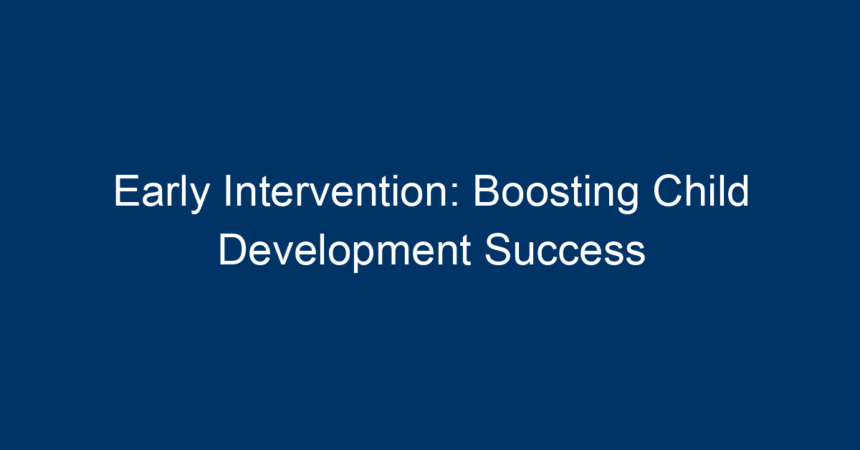In today’s fast-paced world, ensuring the healthy development of children is more crucial than ever. Early intervention plays a pivotal role in this journey, providing essential support to children and families during the foundational years of life. This article delves into the significance of early intervention, its benefits, and actionable strategies to enhance child development success.
What is Early Intervention?
Early intervention refers to a series of services and supports designed to address developmental delays and disabilities in young children, typically from birth to age three. These services can be aimed at enhancing the child’s physical, cognitive, communication, social, and emotional skills. By identifying potential challenges early, families can provide their children with the tools and resources they need to thrive.
The Importance of Early Intervention in Child Development
1. Critical Periods of Development
Research indicates that the first few years of a child’s life are critical for brain development. During this time, the brain forms neural connections that are fundamental for cognitive, social, and emotional growth. Early intervention leverages this window of opportunity by identifying and addressing developmental delays when the brain is most pliable.
2. Long-term Benefits
Studies show that children who receive early intervention services demonstrate significant improvements in various areas, including academic success, behavior, and social skills. These children are often better equipped to navigate the educational system, leading to improved outcomes in school and beyond.
3. Strengthening Family Relationships
Early intervention not only supports the child but also empowers families. Providing parents with resources, education, and support helps them understand their child’s needs and how to best advocate for them. When parents feel equipped and informed, it fosters a stronger familial bond, which is crucial for a child’s emotional well-being.
Key Areas Addressed by Early Intervention
1. Physical Development
Physical development encompasses gross and fine motor skills. Early intervention services provide therapies such as physical therapy to help children meet their milestones, whether it’s crawling, walking, or developing coordination. Engaging activities tailored to the child’s needs can significantly enhance their physical capabilities.
2. Communication Skills
Language is vital for expressing needs and emotions. Early intervention can involve speech therapy to address delays in communication. Techniques such as sign language, interactive play, and reading aloud can stimulate language development and improve communication skills.
3. Social and Emotional Development
Children thrive in environments where they feel safe and understood. Early intervention programs often focus on social skills training, helping children learn how to interact with peers and adults. Strategies to enhance emotional regulation and understanding can significantly influence a child’s ability to navigate social landscapes throughout their life.
4. Cognitive Development
Cognitive skills are essential for problem-solving and critical thinking. Early intervention allows caregivers and educators to work with children on activities that foster curiosity and exploration. Engaging with educational toys, puzzles, and interactive games can enhance cognitive development and ensure children are prepared for formal schooling.
Strategies for Implementing Early Intervention
1. Identify Signs of Developmental Delays Early
Parents and caregivers should be aware of the typical milestones for their child’s age group. Signs of developmental delays include difficulty in communication, motor skills, social interaction, and emotional regulation. Regular check-ups with pediatricians can help in identifying these delays early.
2. Collaborate with Professionals
Early intervention services often require a collaborative approach. Engaging with professionals such as pediatricians, speech therapists, and occupational therapists can provide tailored strategies specific to a child’s needs. These teams can assess progress and adjust support as necessary.
3. Foster a Supportive Environment at Home
Creating an environment conducive to learning is critical. This can include setting a daily routine, providing educational resources, and integrating learning activities into everyday life. Encourage exploration and curiosity through interactive play, as well as establishing a safe space for emotional expression.
4. Educate and Empower Parents
Parent education programs can be incredibly beneficial. Workshops and resources can equip parents with the knowledge and skills they need to advocate for their child. Understanding the ins and outs of early intervention services can help families navigate the available resources and support systems successfully.
The Role of Community in Early Intervention
Community involvement is crucial to the success of early intervention efforts. Here’s how communities can play a supportive role:
1. Awareness Campaigns
Raising awareness about the importance of early intervention can lead to a more educated public. Informational campaigns can help demystify developmental delays and encourage early assessment and support.
2. Access to Resources
Communities can facilitate access to resources such as local early intervention programs, support groups, and educational workshops. Providing easily accessible information about these services can ensure families are aware of their options.
3. Collaboration with Educational Institutions
Partnering with schools and educational institutions to create a smooth transition for children entering pre-kindergarten or kindergarten can make a significant difference. Training educators to recognize and address developmental delays can help ensure children receive the necessary support within the school environment.
Conclusion: Taking Action for a Brighter Future
Early intervention is not just a set of services; it is an essential lifeline for children and families facing developmental challenges. By recognizing the significance of those critical early years, we can take meaningful steps toward nurturing healthy, thriving children.
Actionable Insights:
- Educate Yourself: Familiarize yourself with developmental milestones and signs of delays.
- Stay Engaged: Regularly communicate with pediatricians and specialists to monitor your child’s development.
- Encourage Play: Use interactive play to foster communication and social skills at home.
- Seek Help Early: Don’t hesitate to reach out to professionals if you notice any developmental concerns.
- Involve the Community: Take advantage of local resources, workshops, and support groups.
By prioritizing early intervention, we can significantly boost child development success and ensure that every child has the opportunity to reach their full potential. Early recognition, timely support, and proactive engagement pave the way for a brighter future for our youngest generations.




